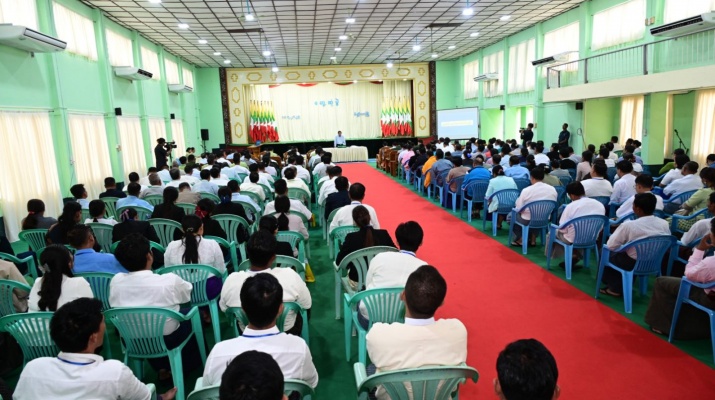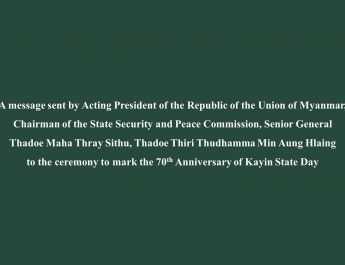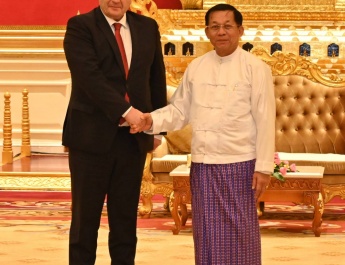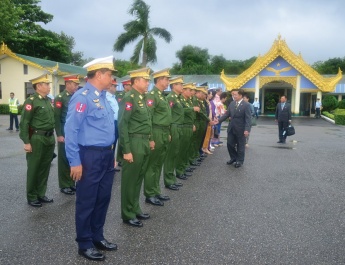Nay Pyi Taw July 10
Chairman of State Administration Council Prime Minister Senior General Min Aung Hlaing met district and township level departmental officials, local elders and MSME entrepreneurs from Meiktila District, Man-dalay Region, at Kandaw Mingala Hall in Meiktila this morning, and discussed regional development.
Also present were SAC Joint Secretary General Ye Win Oo, SAC member General Nyo Saw, union ministers, U Min Naung, U Hla Moe, U Khin Maung Yi, Dr Nyunt Pe, Mandalay Region Chief Minister U Myo Aung, senior military officers from the Office of the Commander-in-Chief, and officials.
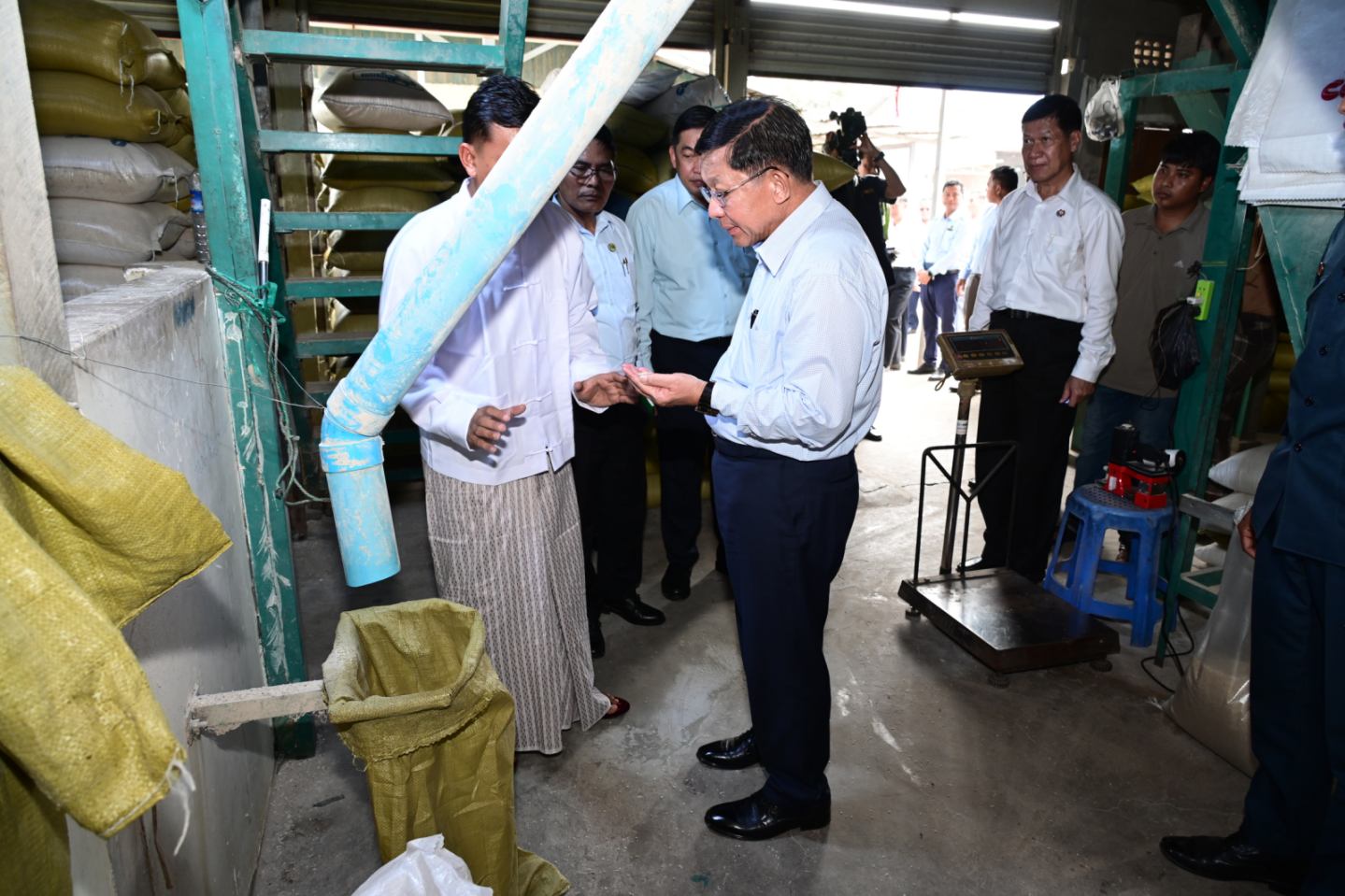
Regional points and ongoing development undertakings reported
Chairman of Meiktila District Management Board U Aung Myint Oo reported on progress in realizing the directives given by the Senior General during trip to the district, ongoing farming activities, rehabilitation and reconstruction of the State-owned and public buildings affected by Mandalay earthquake, progress in carrying out education promotion task, adoption of Meiktila development project, erection and operation of solar-power stations in the district and power distribution, and district all-round development and water supply undertakings.
The Minister for Development Affairs of Mandalay Region presented a report on progress in beautifying the district, improving road transport, enforcing traffic rules, greening the environment, and installing a water supply network in Meiktila. The region chief minister presented a supplementary report on efforts to increase sown acreage of edible oil crops and generate solar power, a renewable energy.
Supplementary discussions
In response, the Senior General said whichever government is in power, only the self-efforts will yield real results. Hence, locals should give priority to the development of their native land and socio-economic progress. Area-wise and ward- and village-wise green zones must be set up, and the work of reducing temperatures and balancing the climate must be done through tree-growing activities. Wards and villages must grow at least two acres of trees in their vicinity in setting up green zones. Continuous tree-growing activities must be conducted on both sides of Yangon-Mandalay Road and Yangon-Mandalay expressway, and trees that do not survive or are depleted for any reason must be substituted with new ones. Future data and facts on population and basic needs must be taken into account thoroughly in drawing town development plans. Croplands vital for national economy and food sufficiency must be spared in extending urban plans. Officials must strive for development of Meiktila District. Solar-power generation must be extended at district and region levels for ensuring electricity sufficiency in the district. Forest plantation and conservation that help ensure adequate water supply must be carried out. Officials must strive for increasing peracre yield and extend kitchen crop cultivation. Collective efforts are required for learning and education promotion.The area must strive for development of education, health, eco-nomic and other sectors. Apart from departmental personnel, local people should also take part in town beautifying activities on their own accord for achieving greater success. Officials must systematically supervise the work of enforcing traffic rules and all drivers should abide by the rules.
Union ministers explain relevant sectors
Union ministers, U Min Naung and U Hla Moe, explained the field tours conducted for progress of agriculture in Meiktila District, arrangements to ensure sufficient irrigation water supply, effective supervision for the systematic and proper use of croplands, Myaseinyaung farming program in the district, formation of cooperative societies and cotton mills for development of cotton plantation, provision of necessary assistance for farmers.
To develop the regional economy, efforts are being prioritized to advance production industries based on agriculture and livestock
Subsequently, in discussions on regional development, the Senior General stated that necessary support and guidance are being provided for the progress of the Meiktila region. The development of Meiktila can be divided into two aspects: economic growth and social advancement. Although the region lacks large-scale factories, small, medium, and micro enterprises (MSMEs) are actively operating. The country’s primary economy relies on agriculture and livestock, and efforts must be made to strengthen the economy by generating regional income. To increase income, production must be enhanced, and sufficient agricultural and livestock outputs must be ensured. Relevant departments must systematically conduct research to achieve this. Universities, such as Meiktila University of Economics and Meiktila University, along with ministries and experts, should collaborate with local communities to conduct research and implement practical solutions for Meiktila’s development. Similar efforts should be extended to other regions. By fulfilling individual responsibilities, each sector can achieve success, contributing to the progress of both the region and the nation.
Many countries worldwide have developed by focusing on agriculture and livestock. However, due to ongoing internal conflicts, political instability, and disagreements, Myanmar has been unable to fully achieve developmental goals. Since 2010, the country has adopted a multiparty democratic system as desired by the people and has implemented a market-oriented economic system.
To boost agricultural productivity, increasing yield per acre will enhance regional income
Strengthening the national economy requires enhancing production capacity, which depends on technological advancements. In agriculture, the four key factors—”seeds, land, water, and methods”—are crucial. Only by systematically applying these can peracre yields improve, leading to higher agricultural output. Calculations show that during the 2023-2024 fiscal year, monsoon rice production in Meiktila Township fell short of targets, averaging only 62.65 baskets per acre, a deficit of 37.35 baskets. With rice priced at Ks- 22,000 per basket, this resulted in a loss of Ks- 10.369 billion. Across Meiktila District, unmet monsoon rice targets led to a Ks- 79.791 billion income loss. Similarly, summer rice production shortfalls caused a Ks- 4.6 billion loss, while groundnut cultivation deficits resulted in Ks- 46.895 billion in losses. Sesame production gaps led to Ks-580.48 billion in losses, and other crops, including sunflower and green gram, contributed to a total agricultural loss of approximately Ks-980 billion. This demonstrates that achiev-ing target yields in agriculture would significantly boost the regional economy, requiring collective efforts.
For agricultural success, high-quality seeds are essential. Re-search must be conducted to develop superior seed varieties. Land preparation should include crops like jute, while livestock waste can be repurposed into organic fertilizers. Adequate water supply must be ensured by utilizing existing resources such as groundwater, rainwater, and river irrigation projects. Proper farming techniques must be followed, ensuring all planted crops thrive according to set guidelines.
Meiktila, located at the crossroads of Myanmar,holds strong potential for success-ful economic activities
As a central hub, Meiktila is well-positioned for thriving economic ventures. By successfully developing local agriculture and livestock industries, products can be distributed nationwide, driving regional progress. Achieving local self-sufficiency first, then exporting surplus goods, will foster growth. MSMEs based on agricultural and live-stock products will flourish, supplying both domestic and international markets. Expanding kitchen crop cultivation and processing them into value-added products will generate more income for the region and the country, improving socio-economic conditions.
For regional development, educated human resources are indispensable
Educational gaps in Meiktila, including low transition rates and school attendance, must be addressed. A region or nation’s progress depends on skilled human resources, necessitating strong support for education. Meiktila, with its colleges and universities, has excellent edu-cational opportunities. Efforts must be made to cultivate a knowledgeable workforce.
Regarding healthcare, the state is ensuring nationwide health and fitness. Hospitals are being upgraded, and medical supplies and medicines are being provided. Sports development is also prioritized, with stadiums and sports facilities im-proved across states and regions. Adequate sports infrastructure fosters athletic spirit and enables proper training. Methodical training and physical fitness programs should be implemented to ensure comprehensive development. Meiktila District must also promote health and sports advancement.
Strict enforcement of land use regulations is necessary
There is a need to implement strict measures to ensure discipline and the proper use of land in Meiktila District. Regarding land use, the Farmland Law and the Vacant, Fallow and Virgin Lands Management Law have already been enacted, and it is necessary to proceed in accordance with the permissions and procedures outlined in these laws. Officials are required to strictly adhere to the rules and regulations prescribed by law.
Preparations are currently underway to hold free and fair multi-party democratic general elections
Free and fair multi-party democracy general elections will be held by the end of this year, with preparations underway to ensure that all eligible voters have the opportunity to cast their votes. Systematic preparations are underway to ensure a free and fair election, prevent errors in the voter lists, and guard against electoral fraud.International observation teams will also be invited to monitor the election, with several countries having already confirmed their participation. He stated that he hopes Meiktila District will also cooperate to ensure the successful conduct of the election.
After the meeting, the Senior General and members warmly greeted district and township-level officials, local elders, and MSME entrepreneurs in attendance.
Thein Min Chili Powder Manufacturing Plant
Afterwards, the Senior General, accompanied by the delegation, arrived at the Thein Min brand chili powder manufacturing plant located in Kyi Taw Kone Ward, Area 8, Wunn Taw Pyae Extension, Meiktila City, where they were warmly welcomed by business owners U Tint Naing Win and Daw Thandar Myo. They then inspected the production process of chili powder at the facility, including the drying of sterilized chilies in solar dryer domes to a moisture content of 8 to 10 percent, depending on the chili variety; the peeling and cleaning of the dried chilies; further drying of the cleaned chilies to a moisture level of 5 percent to prevent mold; grinding; and packaging of the finished products. Following the inspection, the Senior General asked questions and encoura-ged the business owners.
The Thein Min brand chili powder production business is a traditional enterprise established in 1980, currently operating systematically to ensure consumer safety. In accordance with the Head of State’s directive to promote the production of high-value local products in the Meiktila region, chili pickles, chili powder, and chili sauce are being produced and marketed using chilies sourced from the region as well as from the Ayeyarwady Region, Magway Region, and Shan State. In addition to Meiktila District, the company exports its products to Yangon, Mandalay, Magway, Tachileik, Nay Pyi Taw, Pyinmana, Tatkone, Mawlamyine, PyinOoLwin, Bokepyin, Nam San, Taunggyi, Shwe Nyaung, Bago, and Taungoo, and participates in regional and state MSME trade fairs to expand its market reach. It is reported that efforts are being intensi-fied to increase production, as the enterprise creates job opportunities for local residents and offers a domestic alternative to imported products.
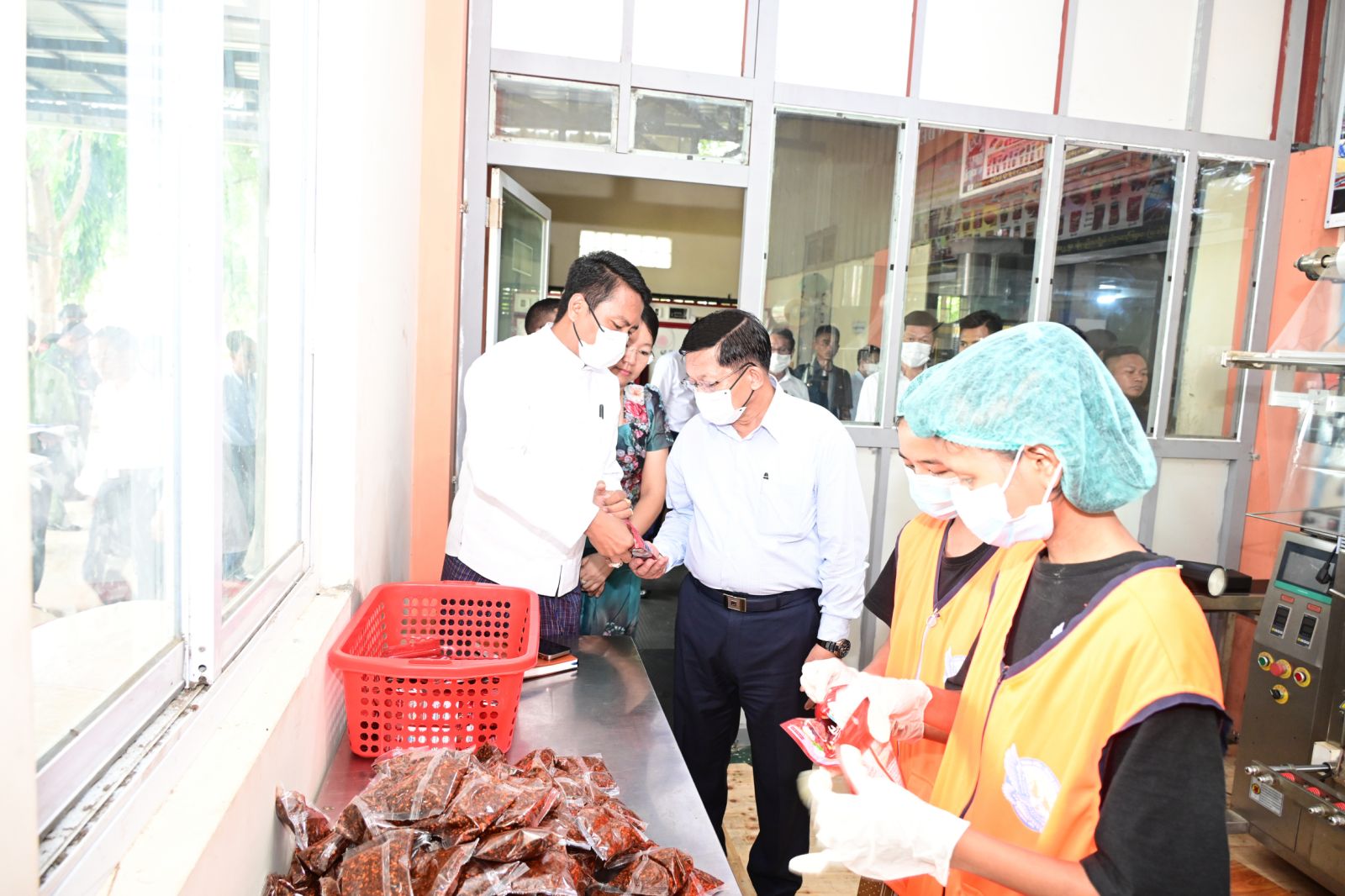
Miba Myittar Advanced Rice Milling Facility
Next, the Senior General, accompanied by the delegation, arrived at the Miba Myittar Advanced Rice Milling Facility in Meiktila, where he was welco-med by business owner U Aung Ye Kyaw and his team. Then, the Senior General inspected the rice milling operations at the factory. He also reviewed the production of rice husk fuel pellets, an environmentally friendly wood substitute that helps reduce wood consumption and prevents the waste of rice husks generated by rice mills. He also inspected the gasifier, which uses rice husk fuel pellets to power an engine and generate commercial electricity. It is reported that he observed the drying of rice using rice dryers and the milling process with rice milling machines, while asking questions, engaging in discussions, and encouraging the pre-sentations made by business owners and officials.


